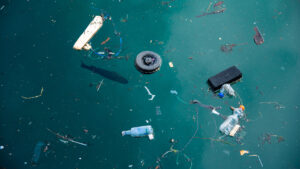Posted on June 5, 2023 in Environmental Sciences Initiative

We’re losing ground on accomplishing Sustainable Development Goal 6 (SDG 6) and need to act now to meet the United Nations’ 2030 deadline. The Global Accelerator Incubator Network for SDG 6 (GAINS6), a collaborative meeting ground for scientists, advocates, and government officials to exchange ideas to help propel SDG 6’s implementation, offers a new hope to reaching the UN’s goal.
The UN’s 17 Sustainable Development Goals (SDGs), established in 2015, serve as the blueprint for advancing human well-being while preserving the environment. The UN describes it as a universal call to action to “end all forms of poverty, fight inequalities and tackle climate change, while ensuring that no one is left behind.” In March 2023, days before the UN’s Water Conference, 600 participants from across the globe gathered virtually and in person for over 24 hours to identify actions and innovations that could help accelerate progress towards SDG 6, which is to ensure access to water and sanitation for all.
The debate, created and hosted by the CUNY ASRC Environmental Sciences Initiative and the Institute for Water Education, took the form of a relay with a virtual baton being passed westward across the globe, hitting nine different time zones. It started in New York at the CUNY ASRC and ended 24 hours later at Hunter College Roosevelt House. As the baton was passed from time zone to time zone, the priority actions shifted and changed, reflecting the local context and priorities of the location holding the virtual baton.
When the baton arrived back in New York, it looked different from how it started; it reflected the diverse ideas across the world and included common themes like frustrations with systematically compromised water resources and sanitation systems, and the seemingly lack of urgency toward implementing solutions from policymakers, investors in water infrastructure, and society in general.
Participants also identified the need to assess investments in water-resource infrastructure (both green and grey) from a human-centered perspective rather than a primarily financial one. “All time zones emphasised the critical need to consider marginalized people, including women and indigenous groups,” said Professor Graham Jewitt, head of the Water Resources and Ecosystems department at the IHE Delft Institute for Water Education. “As with many of society’s challenges, the poor often bear the immediate brunt of society’s poor performance to provide basic water services. Nearly 1 billion people lack the access to clean and reliable drinking water and over 2 billion do not have access to sanitation services,” says Professor Charles Vörösmarty, director of the CUNY ASRC Environmental Sciences Initiative.
In addition to capacity development, each time zones highlighted the need for an SDG 6 literate and competent public-sector workforce to help push SDG 6 forward, as well as the need for water education to be integrated into all curriculums and not relegated to scientific and engineering disciplines. GAINS6, comprised of five areas of focus — governance, finance, data and information, innovation, and capacity development — will be a global network and partnership of water “incubators” providing a safe space and living laboratories to test new technologies and policies, leading to quicker and more effective global implementation of SDG 6.
